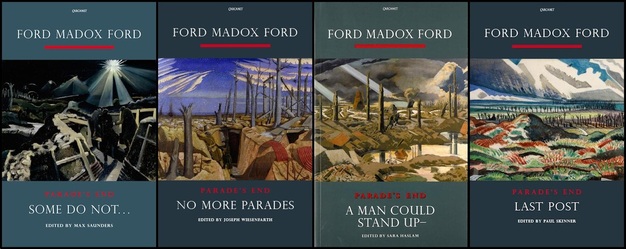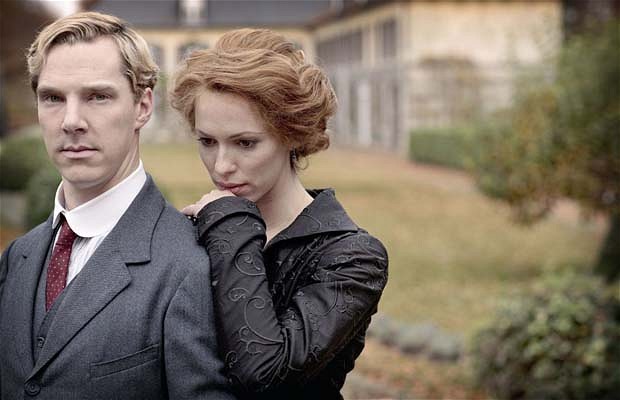Parade's End (1924-1928)
‘There are not many English novels which deserve to be called great: Parade’s End is one of them.’ W. H. Auden
First published as Some Do Not . . . (1924), No More Parades (1925), A Man Could Stand Up– (1926) and Last Post (1928), Parade’s End has been described by Anthony Burgess as ‘the finest novel about the First World War’, by Samuel Hynes as ‘the greatest war novel ever written by an Englishman’, by Malcolm Bradbury as ‘a central Modernist novel of the 1920s, in which it is exemplary’, and by John N. Gray as ‘possibly the greatest 20th-century novel in English’.
The four novels were first combined into one volume under the collective title Parade’s End (which had been suggested by Ford, though he didn’t live to see an omnibus version) in the Knopf edition of 1950. The first annotated and critical editions of the novels, edited by Max Saunders, Joseph Wiesenfarth, Sara Haslam, and Paul Skinner, were published by Carcanet Press in 2010-11. For further information about these groundbreaking volumes, see Carcanet’s website.
In August-September 2012, the BBC screened Tom Stoppard’s five-part adaptation of Parade’s End, directed by Susanna White. Its stellar cast included Benedict Cumberbatch, Rebecca Hall, Adelaide Clemens, Rupert Everett, Miranda Richardson, Anne-Marie Duff, Roger Allam, and Stephen Graham.
First published as Some Do Not . . . (1924), No More Parades (1925), A Man Could Stand Up– (1926) and Last Post (1928), Parade’s End has been described by Anthony Burgess as ‘the finest novel about the First World War’, by Samuel Hynes as ‘the greatest war novel ever written by an Englishman’, by Malcolm Bradbury as ‘a central Modernist novel of the 1920s, in which it is exemplary’, and by John N. Gray as ‘possibly the greatest 20th-century novel in English’.
The four novels were first combined into one volume under the collective title Parade’s End (which had been suggested by Ford, though he didn’t live to see an omnibus version) in the Knopf edition of 1950. The first annotated and critical editions of the novels, edited by Max Saunders, Joseph Wiesenfarth, Sara Haslam, and Paul Skinner, were published by Carcanet Press in 2010-11. For further information about these groundbreaking volumes, see Carcanet’s website.
In August-September 2012, the BBC screened Tom Stoppard’s five-part adaptation of Parade’s End, directed by Susanna White. Its stellar cast included Benedict Cumberbatch, Rebecca Hall, Adelaide Clemens, Rupert Everett, Miranda Richardson, Anne-Marie Duff, Roger Allam, and Stephen Graham.
A DVD of the series has been released, the soundtrack is available, and Faber has published Stoppard’s script.
For further information, see Parade’s End (TV series).
For reviews of the series see the links posted on the Ford Madox Fordies Facebook group.
Mammoth Screen was the production company behind the series - learn more about the company’s relationship with this particular project.
In September 2012, the Ford Society held a major international conference, organised by Ashley Chantler and Rob Hawkes, to celebrate Ford’s masterpiece. For details, go to: Events Archive.
For further information about each novel, go to:
Some Do Not . . .
No More Parades
A Man Could Stand Up –
Last Post
For further information, see Parade’s End (TV series).
For reviews of the series see the links posted on the Ford Madox Fordies Facebook group.
Mammoth Screen was the production company behind the series - learn more about the company’s relationship with this particular project.
In September 2012, the Ford Society held a major international conference, organised by Ashley Chantler and Rob Hawkes, to celebrate Ford’s masterpiece. For details, go to: Events Archive.
For further information about each novel, go to:
Some Do Not . . .
No More Parades
A Man Could Stand Up –
Last Post
Registered Charity No. 1084040 Disclaimer |

